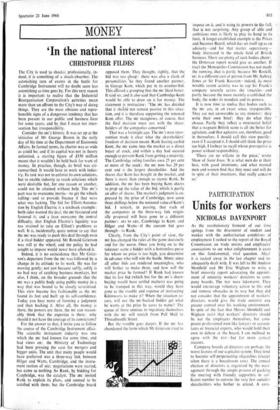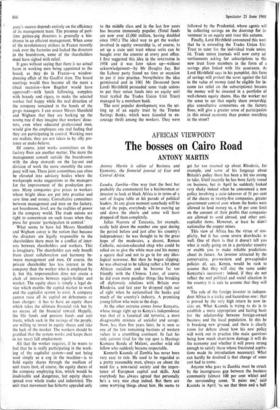Units for workers
PARTICIPATION NICHOLAS DAVENPORT
As the revolutionary ferment of our time springs from the discontent of student and worker with the authoritarian conditions of employment I rushed to the report of the Royal Commission 'on trade unions and employers' associations to see what enlightenment it casts on this fundamental, vital question. Alas! it is tucked away in the last chapter and in- adequately dealt with. it was left to Mr Andrew Shonfield and Mr Eric Wigham to write a brief minority report advocating the appoint- ment of minority workers' directors to com- pany boards. The TUC were lukewarm. They would encourage voluntary action to this end and remove obstacles in its way but they did not consider that the appointment of workers' directors would give the trade unionist any greater control over his working environment. In spite of the fact that Messrs Shonfield and Wigham insist that workers' directors should be not the employees themselves, but com- petent professional men like lawyers or accoun- tants or financial experts, who would hold their own in debate at the board, I am inclined to agree with the ruc—but for more cynical reasons.
Company boards of directors are perhaps the worst feature of our capitalist system. They tend to become self-perpetuating oligarchies (except when there is a boardroom row). The annual election of directors is organised by the man- agement through the simple process of packing the meeting with friendly supporters in suf- ficient number to outvote the very few outsider shareholders who bother to attend. A com- pany's success depends entirely on the efficiency of its management team. The presence of part- time guinea-pig directors is generally a hin- drance to an efficient management. When some of the revolutionary strikers in France recently took over the factories and locked the directors in the boardroom, some of the shareholders must have sighed with relief.
It goes without saying that there is no actual harm in working men being appointed to the board, as they do in France—a window- dressing affair of the Gaullist state. The board meetings would then become all the more a ritual occasion—how Bagehot would have approved!—with lunch following, complete with brandy and cigars, to make the selected worker feel happy while the real direction of the company remained in the hands of the go-go managers. I can assure Messrs Shonfield and Wigham that they are barking up the wrong tree if they imagine that workers' direc- tors, even when educated professional men, would give the employees any real feeling that they are participating in control. Working men are realists; they are not taken in by silly pre- tence or make-believe.
Of course, joint works committees on the factory floor are another matter. The more the management consult outside the boardrooms with the shop stewards on the lay-out and division of work the more smoothly the com- pany will run. These joint committees can often be elevated into advisory bodies where the workpeople make suggestions to the managers for the improvement of the production pro- cess. Many companies give prizes to workers whose bright ideas are put into practice and save time and money. Consultative committees between management and men on the factory, not boardroom, level, are the realities of power in the company world. The trade unions are right to concentrate on such issues when they press for greater 'participation in control.'
What seems to have led Messrs Shonfield and Wigham astray is the notion that because the directors are legally responsible to the shareholders there must be a conflict of inter- ests between shareholders and workers. This is imaginary. The shareholder can only benefit from closer collaboration and harmony be- tween management and men. Of course, the private shareholder has less interest in the company than the worker who is employed by it, but this impersonalism does not create a clash of interests between equity-holder and worker. The equity share is simply a legal de- vice which enables the capital market to work and the capitalist system to exist. A company cannot raise all its capital on debentures or loan charges: it has to have an equity share which takes the ultimate financial risk but by no means all the financial reward. Happily, the life funds and pension funds and unit trusts, which suck in the savings of the people, are willing to invest in equity shares and take the luck of the market. The workers should be gratified that the system works and keeps them in (or near) full employment.
All that the worker requires, if he wants to feel that he is really participating in the work- ing of the capitalist system—and not being used simply as a cog in the machine—is to hold equity shares through the medium of unit trusts (not, of course, the equity shares of the company employing him, which would be inadvisable and dangerous, but equity shares spread over whole trades and industries). The unit trust movement has hitherto appealed only
to the middle class and in the last few years has become immensely popular. (Total funds are now over £1,000 million, having doubled since 1965.) The ideal way to get the worker involved in equity ownership is, of course, to set up a state unit trust whose units can be bought over the counter at every post office. I first suggested this idea in the SPECTATOR in 1958 and it was later taken up—without acknowledgement—by Mr Douglas Jay. But the Labour party found no time or occasion to put it into practice. Nevertheless the idea germinated and in 1961 Mr Desmond (now Lord) Hirshfield persuaded some trade unions to put their union funds into an equity unit trust (called the Trades Union Unit Trust) managed by a merchant bank.
The next popular development was the set- ting up of an equity trust by the Trustee Savings Banks, which were founded to en- courage thrift among the workers. They were followed by the Prudential, whose agents will be collecting savings on the, doorstep for in- vestment in an equity unit trust this autumn.
Finally, Lord Hirshfield announced this wed, that he is extending the Trades Union Uni Trust to cater for the individual trade union ist. Trade union journals will now carry ad- - vertisements asking for subscriptions to this new trust from members in the form of a savings plan linked with life assurance. As Lord Hirshfield says in his pamphlet, this form of savings will protect the saver against the fall in the value of money (and be eligible for in- come tax relief on the subscriptions) because the money will be invested in a portfolio of well-chosen equity shares. Has the worker not the sense to see that equity share ownership. plus consultative committees on the factory floor, will give a greater sense of participation in this mixed economy than protest marching in the street?







































 Previous page
Previous page